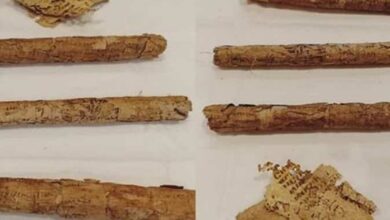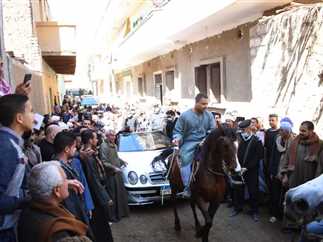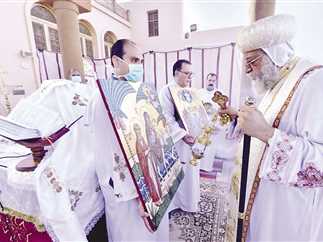Egyptian Press on Sunday followed on the aftermath of the death of six Coptic Christians and a Muslim security guard in the town of Naga Hammadi in southern Qena Governorate. State-owned papers described the incident as "an act of terrorism" and announced that around 42 rioters were arrested in villages near the conflict-marred town, while others, such as Al-Dostour, took discussions to the next level by analyzing reactions and whether or not this will be the last wave of violence against Copts.
Government-run Al-Ahram said that 14 Muslim and 28 Christian protesters were arrested in Bahgoura and Ezbet Tarkas villages in Naga Hammadi after 12 shops, seven houses, and three motorbikes were torched a day earlier during heavy rioting. The newspaper said that security was able to "contain" the violence and disperse the rioters, and reported that Muslims and Christians had attacked each other with stones, and even fired guns at some point during the clashes. Al-Ahram said that 200 truckloads of riot police were mustered to deal with fighting in the village, a few kilometers away from downtown Naga Hamadi where the attack occurred on Coptic Christmas eve.
The drive-by shooting at the Coptic deacons, which wounded ten in addition to the six killed, are suspected to be in retaliation for the November rape of a Muslim girl by a Christian man in the nearby town of Farshout, according to the Ministry of Interior. They are the latest in a series of assaults against Christians, who consitute around eight to ten percent of the population and are members of the oldest church in the world.
Al-Ahram said that the three men, Mohamed Ahmed el-Kamouny, Qurashi Abu Haggag and Hindawi Sayyid Hassan, are now in police custody, and believed to be the perpetrators of the attack. They will be charged with "commission of terrorist acts" in addition to manslaughter, disturbing the peace, possession of firearms, and vandalism. Qena’s prosecution office has already started interrogating the suspects, who will be detained for 15 more days, Al-Ahram said.
Rose el-Youssef, another pro-government newspaper, quoted Shura Council speaker Safwat el-Sherif as saying that the "murderers" and dissent leaders "will receieve no mercy since they killed the holiday joys of all Egyptians." El-Sherif called on newspapers and Egyptian media to work to calm people and assuage their pains "instead of giving their ears to those who want to mislead them outside and inside of the country," according to Rose el-Youssef.
El-Sherif urged schools to "ingrain the principles of citizenship among students and promote moderation." Meanwhile, Legal Affairs Minister Mufid Shihab said that this not a case of Muslims rising against Copts but "criminals against Egyptians." Almost all of the state-controlled newspapers now refer to the victims of the sectarian attacks not as "Copts" or "Christians" but as "Egyptians," perhaps in an attempt to lower the impact of the act which sent shock-waves across the Coptic community and provoked a backlash against the Egyptian government from the international press, particularly American and British.
Al-Dostour, like other independent newspapers, seem to be sounding the alarm on the issue, with a full coverage of the aftermath of the clashes, in addition to providing commentary and analysis on sectarian clashes against Copts.
Editor-in-chief Ibrahim Eissa in his daily column predicted that this act of violence against the Copts will not be the last, saying that the intensity, frequency, cruelty and extremity of recent attacks are a sign of danger. "I don’t want to alarm you. But I don’t think this trend will disappear during the next few years. Nothing on the horizon suggests it will," Eissa wrote. He then went on to list some of the reasons why he believed violence against Copts is only increasing.
"One hundred percent the attacks against churches that Copts try to build or pray in in the villages of Upper Egypt do not involve Muslim extremists or terrorists groups, but members of the public, normal people who never joined a terrorist or militant group," he said.
"The accidents have moved beyond upper Egypt and the south, where there is a heritage of sectarian violence, and into a wider area in Egypt. Alexandria, Mahalla and the Delta have all witnessed several incidents in the past few years," Eissa added.
Also in Al-Dostour, journalist Wael Abdel Fatah posed a question in a hypothetical reverse scenario: What if the alleged rapist was Muslim instead of Christian and Christians had attacked Muslims on their holiday in the town’s mosque? "Were the family of victims going to kill all Muslim youth in revenge of the sexual assault?" he asked.




